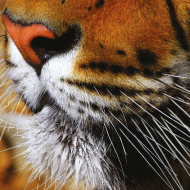Two smuggled tigers seized a week, report shows

Skins remain the single most frequently seized tiger part. On average, nearly 58 whole tiger skin equivalents were seized every year.
A new report on tiger trafficking suggests more than two tigers a week have been seized since the turn of the century.
New analysis by the wildlife group TRAFFIC found that 2,359 tigers were seized from 2000-2018 across 32 countries and territories globally.
Nearly all of the seizures (95 per cent) were recorded in countries that are home to tigers. India, which is home to the world’s largest wild tiger population, saw the highest number of seizures overall, accounting for more than 40 per cent of total incidents and a quarter of tigers seized (26.5 per cent).
Outside the tiger’s range, 56 seizures were recorded, with Taiwan and Mexico reporting the highest number of tigers seized - 39 and 13 tigers respectively.
The report found tiger skins remain the single most frequently seized tiger part. On average, nearly 58 whole tiger skin equivalents were seized every year.
More recent data
Analysis of the dataset from more recent years shows a four-fold increase in the yearly number of seizures in Indonesia between 2015 and 2018. As a result, the number of tigers involved almost doubled. Indonesia continues to see large seizures of tiger parts, including one earlier this month. At least a dozen skins were taken from an East Javan workshop that made traditional dance masks.
Captive sources
Authors of the report believe a significant number of tigers from captive sources were seized during the 19-year study period. In fact, more than half (58 per cent) of tigers seized in Thailand and 30 per cent in Vietnam were identified as originating from captive breeding facilities. The largest proportion came from a single seizure of 187 tigers in Thailand in 2016.
At least 366 tigers seized were from either known or suspected captive sources.
When looking at available data on trafficking routes, from just 231 incidents, nearly 90 per cent of Vietnam’s reported tiger trafficking route implicated a supply of tigers from Lao PDR, which does not have a viable wild tiger population. This hints at a captive source, the study concludes.
Kanitha Krishnasamy, TRAFFIC’s director for Southeast Asia said: “This pernicious trafficking—evidenced by the continuously high number of whole skins, whole animals—both dead and alive—and bones is testament to the ongoing demand for tiger parts. The time for talking is over: words must be turned into action to prevent further tiger loss.”
As the 18th meeting of CITES gets underway in Geneva (17-28 August), TRAFFIC is calling for action to prevent tiger parts and derivatives from captive facilities entering the illegal trade chain.



 The Veterinary Medicines Directorate (VMD) is inviting applications from veterinary students to attend a one-week extramural studies (EMS) placement in July 2026.
The Veterinary Medicines Directorate (VMD) is inviting applications from veterinary students to attend a one-week extramural studies (EMS) placement in July 2026.